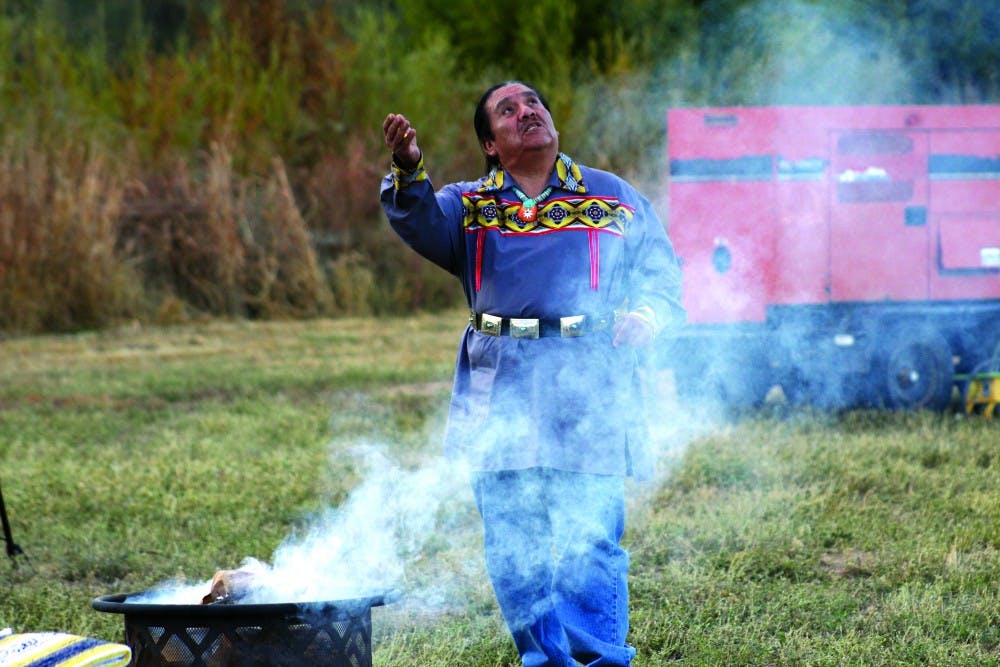Burqueños gathered at the Valle de Oro National Wildlife Refuge on Monday to celebrate Indigenous Peoples’ Day and converse about preserving New Mexico’s native plant and animal species.
The Valle de Oro, which is managed by the United States Fish and Wildlife Service, occupies 570 acres of ancestral and contemporary lands belonging to the Tiwa people.
As the attendees finished filling their plates, Rosie Thunderchief, the event’s lead organizer, kick-started the evening with a recounting of her poem, “Manifest Destiny.”
“Even though on the surface, it may seem this nightmare they call the ‘American Dream’ has erased our native sense of being, they don’t realize that we’re manifesting our own destiny,” Thunderchief said.
After Thunderchief spoke, the manager of the Valle de Oro, Jennifer Owen-White, offered a land acknowledgment, which is traditional for events occurring at the refuge.
“The Tiwa peoples have stewarded these lands for generations and continue to play a vital role in the lands’ protection. Let this land acknowledgment be an opening for all of us to contemplate ways to join in indigenous movements for sovereignty and self-determination,” she said.
Brophy Toledo, a Flower Hill Institute representative from the Jemez Pueblo, then lit a ceremonial fire while chanting a prayer in his native language. He explained the historical significance of the sacred flame and its ability to connect individuals across diverse nationalities and backgrounds.
“We are all Earth people, and there is no difference between Earth people,” Toledo said, observing the fire’s smoke drift towards the sky.
Following Toledo’s example, Eddie Paul Torres from the Isleta Pueblo also recited a brief prayer in his indigenous language, which he later explained wished for good thoughts, good heart, and healthy and long life for his listeners.
Torres then proclaimed the significance of the event and of the day overall.
“Through the continued strengthening of our relationship among tribes, lawmakers and the state, we as a native people have increased influence in state policy that impacts our lives,” he said. “The reclamation of Columbus Day is one such symbolic achievement.”
Toledo referenced the official name replacement from “Columbus Day” to “Indigenous Peoples Day,” which was passed and signed into law with House Bill 100 earlier this year. The new law resonates strongly with the 24 Native American tribes in New Mexico, whose inhabitants make up nearly 10.5% of the state’s population.
Get content from The Daily Lobo delivered to your inbox
The University of New Mexico has shown support for this bill.
As officially recognized by the University in an email sent out on Monday, Indigenous Peoples Day is meant to bring awareness to the struggles of Indigenous People; honor all they bring to UNM through their culture, language, arts, knowledge and values; and recognize the University campuses as being located on their ancestral land.
At the event, a panel with four other speakers in addition to Torres, Toledo and Thunderchief, were featured, as well.
Julia Bernal, representing Sandia Pueblo, Taos Pueblo and the Yuchi/Creek Nations of Oklahoma, focused her discourse on the threats of oil and gas industries on indigenous lands specifically the Greater Chaco region.
“We’ve been blessed to have been welcomed into different organizing spaces and to help educate our Pueblo communities on the adverse and negative impacts of the oil and gas industries,” Bernal said.
Roger Fragua, a Flower Hill Institute representative from Jemez Pueblo, emphasized the importance of bringing attention to species in peril and cultural preservation; he cited the need to raise more farmers and more diverse crops while really looking at water conservation, healthy soil and overall restoration.
When asked how she hoped her words could impact listeners, Shannon Romero — the Cultural Education Specialist at the Indian Pueblo Cultural Center—said that her words would give a platform for spreading wisdom about her people’s traditional knowledge that has been passed down throughout generations.
After the panel discussion, the evening culminated with a performance of Pollinator Dances by youth dancers from Jemez Pueblo. The event’s cuisine was inspired by pre-conquest nutrition featuring red chile posole and elk meat among other delicacies.
Beatrice Nisoli is a beat reporter at the Daily Lobo. She can be contacted at news@dailylobo.com or on Twitter @BeatriceNisoli






